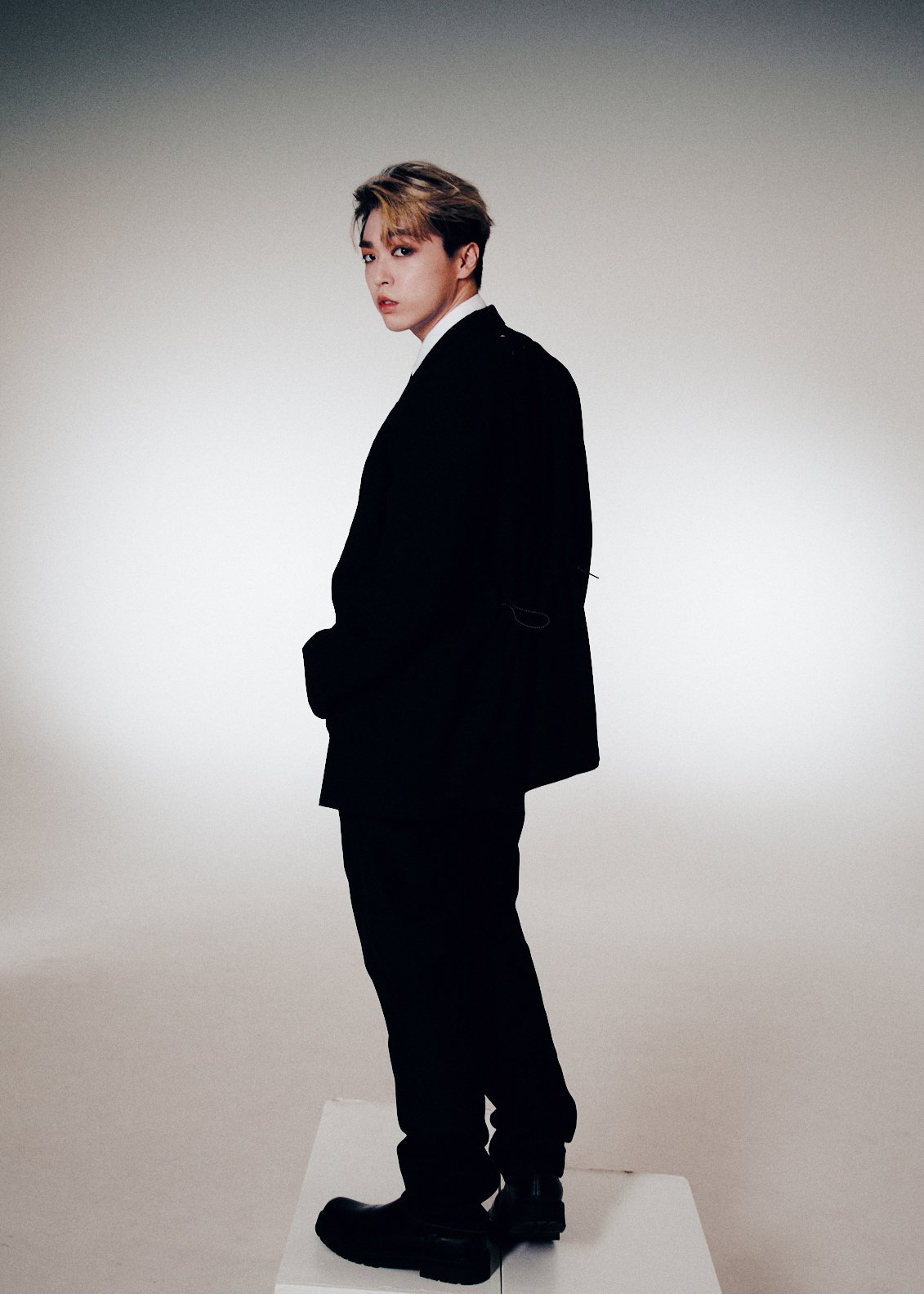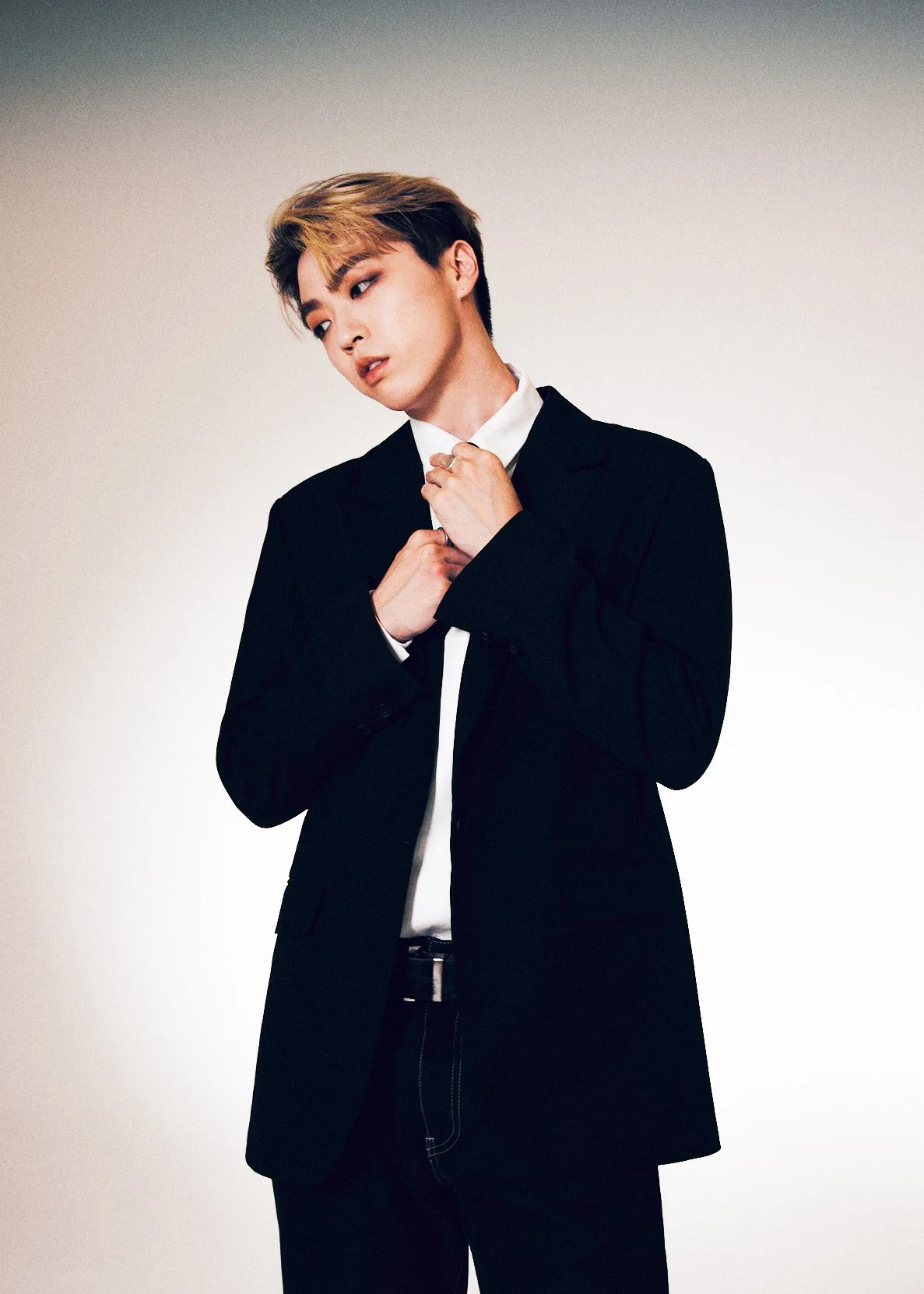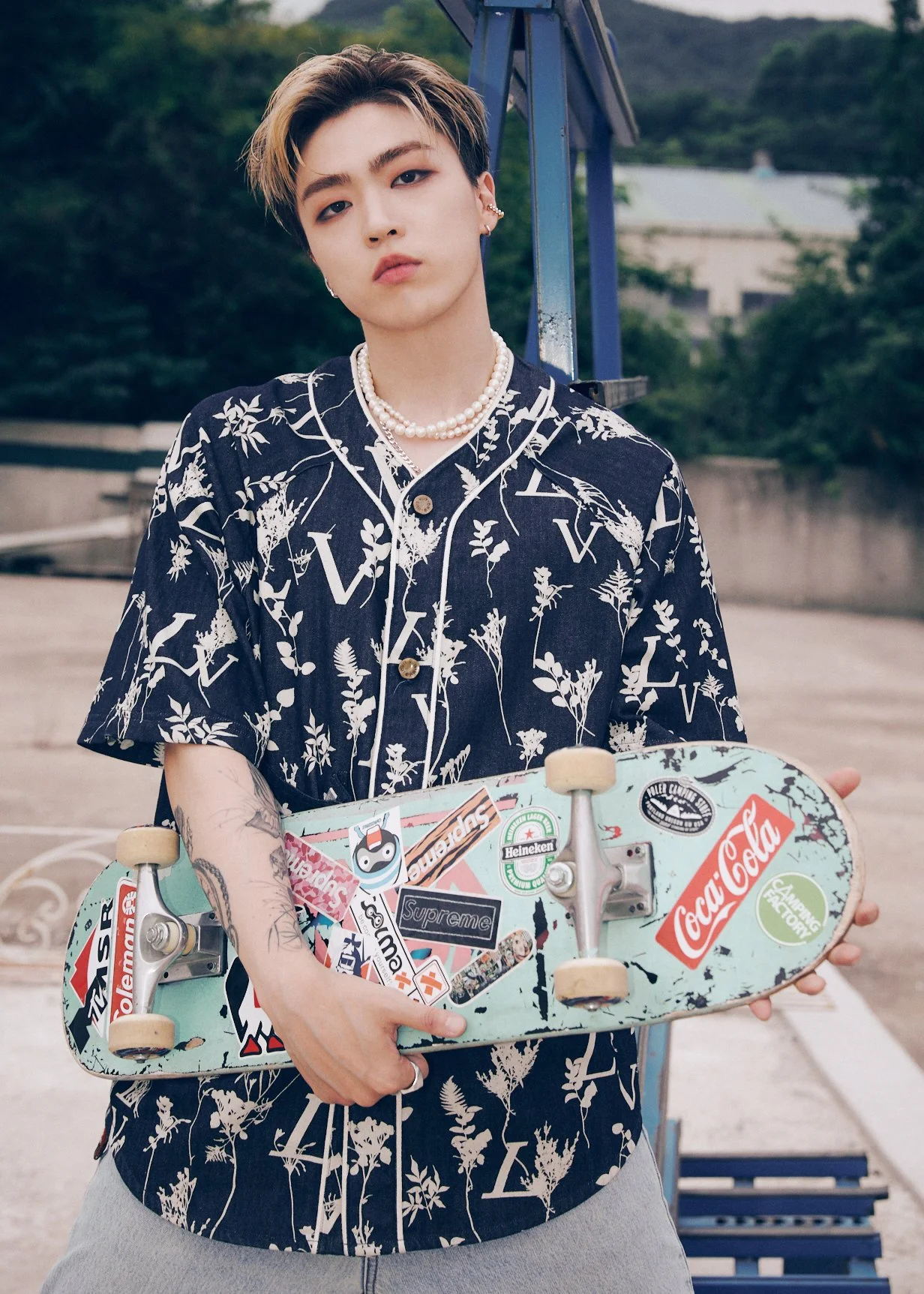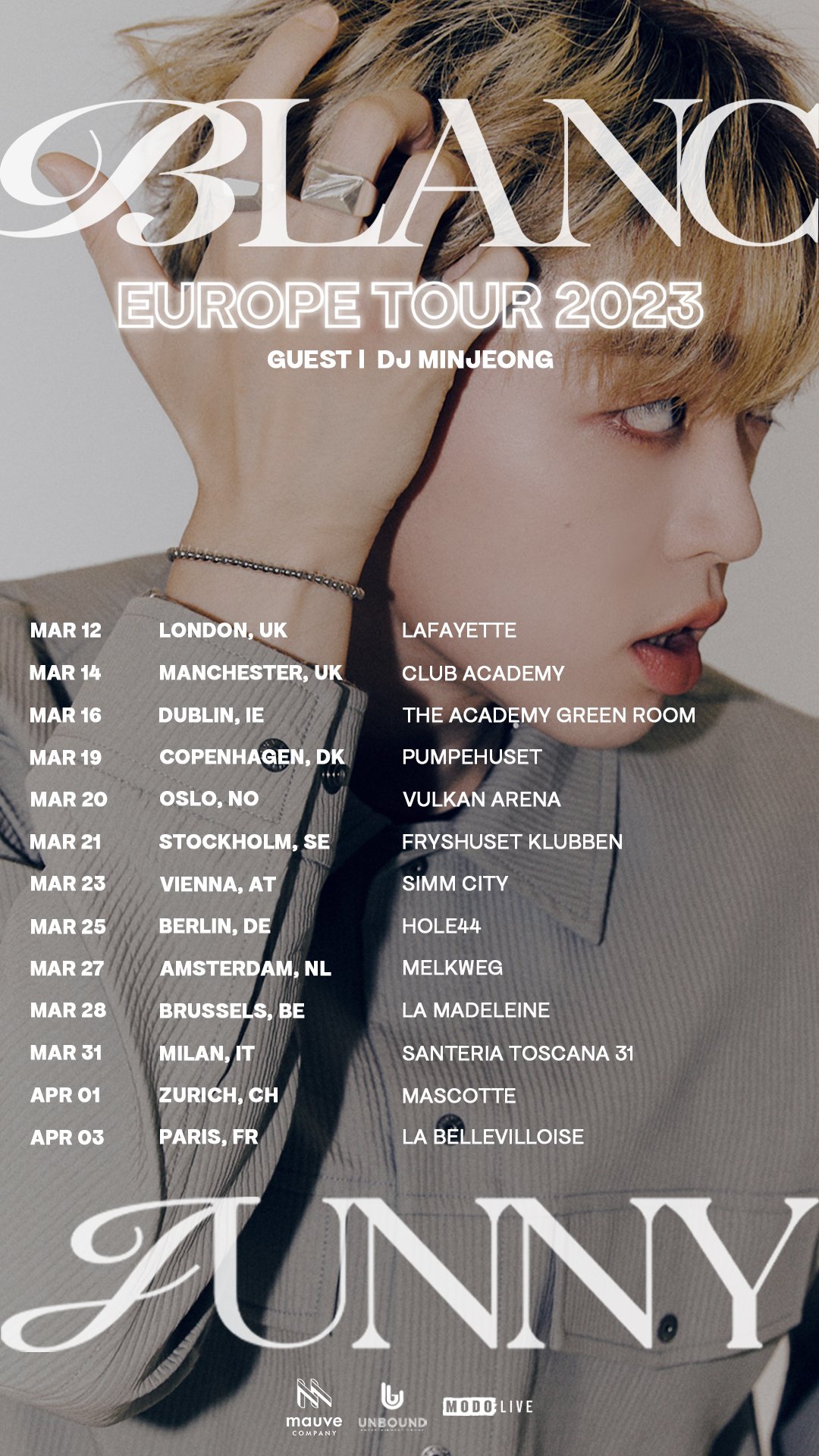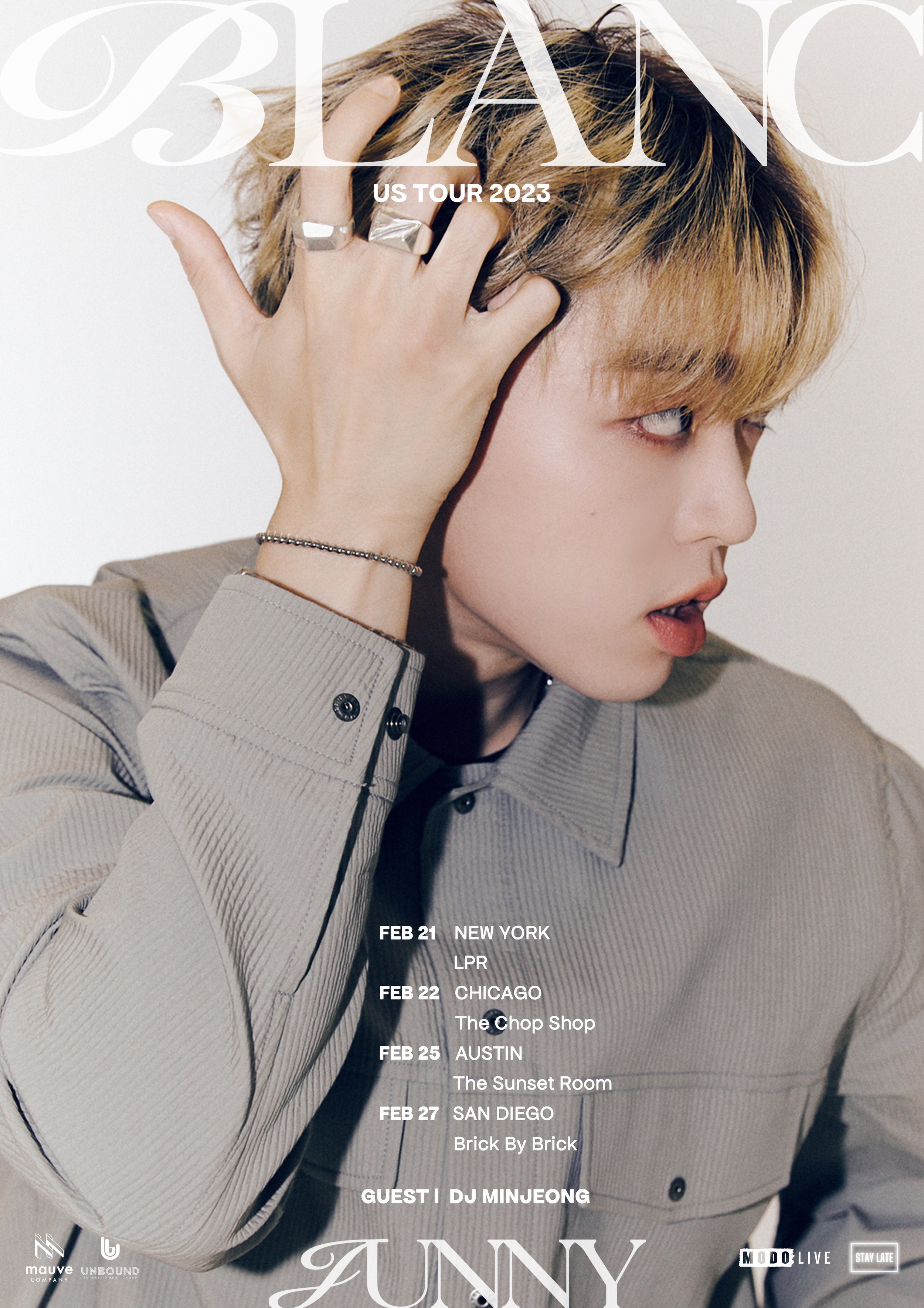[INTERVIEW] JUNNY On Why The Upcoming ‘blanc’ Tour Inspires Him
Unbound Entertainment Group/ MAUVE Company
When Junny completed the first leg of his ‘blanc’ tour last year, he went home to Vancouver to see his family and recharge. But memories from the road kept coming back to him, and he began to see how much the tour had changed him. Soon, he felt the pull to perform again. “Touring gives me a lot of inspiration and energy, especially in terms of music. I love performing in the States,” he told me this week over Zoom. “And when I found out we had the opportunity to go to the cities we’re going to hit, I said, ‘Hell yeah, let’s do it.”
The ‘blanc’ tour will open in New York on February 21, before traveling to Chicago, Austin and San Diego. But Junny’s tour doesn’t stop in North America. In March, he heads to Europe, making him the first-ever Korea-based soloist to visit 13 countries on the continent within one tour. “My first time touring was a big learning curve,” he explained to me. “I learned so much about myself, how to take care of myself, and how I’m able to perform.”
The ‘blanc’ tour is in support of Junny’s first studio album of the same name, but it is not by any means his first release. Though he’s only 26-years-old, Junny is a veteran in music: a rare supernova of a songwriter and singer, who has written songs for some of K-Pop’s brightest artists and who’s own solo career is one of wonder. Last year he released “Not About You”, an arena-sized pop song that he tells me he genuinely loves. “I want to perform it for the rest of my life,” he said. But Junny’s musical output is diverse and enigmatic: Take a listen to his six year spanning discography and you’ll find an adventurous artist eager to challenge himself and play with different textures and genres.
Touring reminded Junny how much his music has evolved since he first became interested in being a musician. “I realized I have so much love for these R&B songs I created in the past,” he reflected, and he noticed how much the crowd responded to them. “I’d like to focus on that again and branch out. It gave me direction and opportunities to take my genre style somewhere new.”
Unbound Entertainment Group/ MAUVE Company
Junny’s music has functioned like a blank canvas for most of his career. This medium is almost by unconscious choice: He’s a 90s kid who came of age in the late aughts when pop and rap music collided on the Billboard Hot 100. From a young age, Junny noticed how artists in the late 2000s were audaciously experimental with the beats they created. “I feel really lucky to have grown up with that music,” he told me. On the radio, Junny heard Kanye West, who was being hailed an artistic genius thanks to his volcanic album “Graduation”, or T-Pain who blurred the lines of pop, rap, and autotune with tracks like “Buy U a Drank”. But at home, in his parents basement, his two older brothers played him something unique and personal: The music of Korea.
“My brothers didn’t really listen to idol music,” he remembered, “but they loved Korean ballads and R&B. I was able to appreciate what good music was [from them]. From a young age, I was able to identify that and I think that’s what I have to thank my brothers for.” Junny would hear most of these songs at his family’s karaoke nights, when his family would sing many of the popular Korean ballads. “My parents also love music,” he added. “So I would be interested in what they were singing at karaoke night, too.”
Junny never listened to K-Pop until he found BIGBANG, the enormously popular YG Entertainment boy group. In 2008, the group’s rapper G-Dragon released “This Love”, which sampled Maroon 5’s popular song of the same name. Junny still remembers how stunned he was the first time he heard “This Love”. “It was really interesting to see that there are Koreans doing this,” he remembered. “At the time, I saw it as a totally different thing, Korean music and Western music.” As a kid growing up in Vancouver, he had never seen Koreans make music like this. “BIGBANG took the Western sound over to Korea and I was really appreciative of that,” he told me.
Looking back today, Junny sees how this interpolation of music, languages and diasporas influenced how he eventually approaches music now. “I found these artists that were right in the middle, like what I’m doing right now,” he said. “I think that’s what made me create this kind of music. It all came from what I grew up listening to.”
At 21, still living with his parents but with dreams of becoming a singer, Junny released “Monochrome”, his debut EP. “Monochrome” dropped at a time when a generation of renegade young musicians exploded on SoundCloud without the help of the gatekeepers of music. “Back then I didn’t have anyone to work with,” he explained. “‘Monochrome’ was an album I worked on solely by myself.” Hearing the music today, he says he hears the “imperfections”. “I hear the young me trying to be cool,” he said with a laugh. “I hear the hungry me in full, hard-grind mode. I just wanted to do everything I could to succeed. But,” he continued, “I think that’s the beauty of this. It’s shown that I can even see that I’ve improved as a songwriter.”
Junny eventually found his voice writing for others in Korea. You’ve likely heard this work: He’s written some of the biggest songs for NCT Dream, KAI, and IU. It’s a skill that he compares to “being like an actor”. He’s learned how to take someone else’s voice and adapt his style. He offered an example. “Most of the time, when I’m writing for a group like NCT Dream, I’m trying to write a great song for myself,” he said. But then, he would begin to incorporate pieces with specific artists in mind. “I’ll add a rap verse and I’ll imagine [NCT’s] Mark doing a rap verse,” he said with a laugh.
“As a fan, you want a certain thing,” he said. “You want them to perform a certain type of song.” His job is arguably the coolest because he gets to have his favorite artists perform the songs he hears in his head. “What I’ve learned from these artists,” he said, “is that it’s not just about just writing a song but the full package. In order for me to become a natural artist rather than a songwriter, I have to get out of that bracket. I have to figure out how to show myself more and have my own style.” He paused and then said with a laugh, “I think to myself, ‘I gotta step my game up.’”
Unbound Entertainment Group/ MAUVE Company
Junny’s live show is a musical journey. For the first leg of ‘blanc’, he began with a banger: the album’s lead single, “COLOR ME”, before easing into “Oblivious”, a b-side, and his latest single, “Not About You”. “I wanted to get the breakup songs out of the way,” he said, “So I could enjoy the night with you guys.” But stick with Junny and he’ll take you deep into his musical archive. “I’m very appreciative of my fans who have been there since the beginning,” he said. “So I wanted to take them back in time slowly.”
The tour’s setlist has given Junny a chance to revisit some of these songs that are buried deep inside his discography. The world he paints on stage is full of color and vibrancy, and it tells a story of an artist still coming into his own. “I kind of see it as, ‘This is who I was, and now I’m going to move on to something bigger,’” he said. “I want my fans to take it all in and expect something bigger next time.” For this tour, Junny promises a revised, tightened up setlist and at least one song that is not on streaming platforms. “That is a gift for my fans,” he said.
What I find most compelling about Junny’s live shows is that it is the opportunity to see a musician on the verge of something huge. “I didn’t want to have a strong color,” he told me. “I wanted to be an artist that tries different genres and tries to incorporate everything together.” Instead, the brushstrokes of his career are a collection of so many influences. His identity, as a Korean-Canadian, connects him to a wide range of Western-born artists, like Sam Kim and Eric Nam., who are changing the industry These connections remind us, too, of the bold swings idol groups like BIGBANG took to appeal to kids like Junny. Together, all of these musicians are converging to forge new narratives in Korea.
“I think writing for others really impacted how my voice changed because I had to sing for other artists and learn how to manipulate my voice. That helped me understand what my voice was.” He thought back to “Monochrome”, an album that I got the impression he hadn’t given much thought to in the past few years. “I just wanted to sound hip, I just wanted to sound cool. I wanted to be the boss,” He smiled as he remembered this. “But now I’ve figured out what my voice is.”
We let the thought linger in the air for a moment. Junny, the artist, the songwriter, the younger brother, is still evolving.
Tickets for Junny’s blanc tour are on sale now. Don’t miss him!


